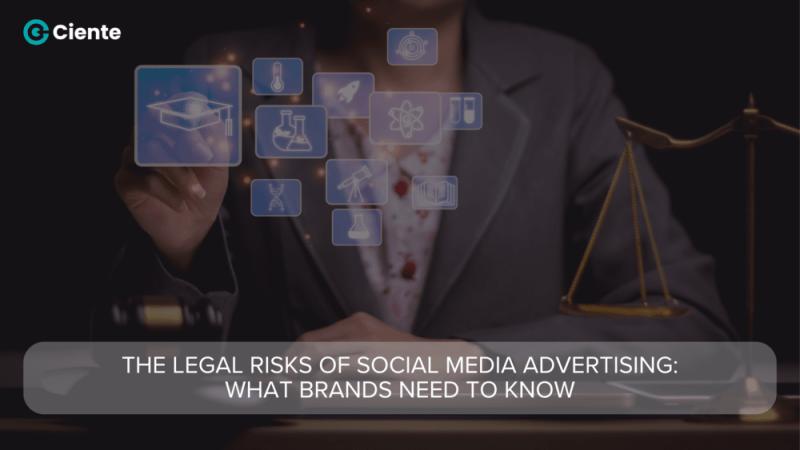The Legal Risks of Social Media Advertising: What Brands Need to Know

In today’s digital age, social media has become a powerful
tool for brands to connect with their audiences. From Facebook and Instagram to
TikTok and LinkedIn, businesses leverage these platforms to build brand
awareness, engage with customers, and drive sales. However, along with the
tremendous opportunities come significant legal risks that brands must navigate
carefully. This is particularly true for Martech Startups, which often rely on
venture capital to fuel their growth and need to ensure that their marketing
practices are legally sound.
Understanding the legal landscape of social media
advertising is essential for avoiding lawsuits, fines, and reputational damage.
Here’s what brands need to know about the legal risks associated with social
media advertising and how to mitigate them.
1. Truth in Advertising: Avoiding Deceptive Practices
One of the most significant legal risks in social media
advertising is deceptive or misleading content. The Federal Trade Commission
(FTC) in the United States, along with similar regulatory bodies worldwide,
enforces truth-in-advertising laws. These laws require that advertisements,
including those on social media, must be truthful, not misleading, and backed
by evidence.
Brands must be especially careful with influencer marketing,
where influencers promote products or services to their followers. FTC
guidelines mandate that influencers disclose any material connection they have
with the brands they promote, such as receiving free products or payments.
Failure to do so can lead to hefty fines and legal action against both the
brand and the influencer.
How to Mitigate the Risk:
Ensure all claims in your social media ads are truthful and
substantiated. When working with influencers, establish clear guidelines for
disclosure and monitor compliance regularly. Consider using hashtags like #ad
or #sponsored to make sponsorships explicit.
2. Intellectual Property Infringement
Using copyrighted content, trademarks, or other intellectual
property without permission can lead to legal disputes. This is a common risk
on social media, where images, music, and other content are easily shared and
reused. Brands might unintentionally infringe on someone’s intellectual
property rights when using third-party content in their ads or posts.
For example, using a popular song in a video ad without
obtaining the proper licensing can result in a copyright lawsuit. Similarly,
using another company’s logo or branding elements without authorization can
lead to trademark infringement claims.
How to Mitigate the Risk:
Always obtain the necessary licenses or permissions before
using third-party content in your social media ads. Work with legal counsel to
ensure your content complies with intellectual property laws. Additionally,
create original content whenever possible to avoid potential infringement
issues.
3. Privacy Violations
Privacy is a growing concern for consumers, and privacy laws
are becoming more stringent worldwide. Social media platforms collect vast
amounts of data from users, and brands often use this data to target their ads.
However, improper handling of personal data can lead to privacy violations and
legal consequences.
The General Data Protection Regulation (GDPR) in Europe and
the California Consumer Privacy Act (CCPA) in the United States are two major
privacy regulations that impose strict rules on how businesses collect, store,
and use personal data. Violations of these regulations can result in severe
fines and damage to a brand’s reputation.
How to Mitigate the Risk:
Comply with all relevant privacy laws and regulations.
Ensure that your social media ads respect user privacy, and avoid collecting
more data than necessary. Implement robust data protection measures and be
transparent with consumers about how their data will be used.
4. Advertising to Minors
Advertising to minors presents a unique set of legal
challenges. Many social media platforms have large user bases under the age of
18, and advertising to this demographic comes with specific regulations. For
example, in the U.S., the Children’s Online Privacy Protection Act (COPPA) sets
strict rules for collecting personal information from children under 13.
Brands must be cautious when targeting younger audiences on
social media to avoid violating child protection laws. This includes ensuring
that ads are age-appropriate and do not exploit the vulnerabilities of young
users.
How to Mitigate the Risk:
Familiarize yourself with the legal requirements for
advertising to minors in your target markets. Use age-targeting tools provided
by social media platforms to ensure that your ads are not shown to users under
the legal age threshold. Additionally, avoid creating ads that could be
perceived as manipulative or exploitative toward young audiences.
5. Contractual Obligations with Social Media Platforms
When brands advertise on social media, they enter into
agreements with the platforms. These agreements often contain terms and
conditions that govern the use of the platform's services. Violating these
terms can lead to legal disputes, account suspension, or termination of
services.
For example, Facebook and Instagram have strict policies
regarding the types of content that can be promoted. If a brand’s ads violate
these policies, the platform may take down the ads or suspend the brand’s
account, resulting in lost revenue and reputational harm.
How to Mitigate the Risk:
Carefully review the terms and conditions of each social
media platform you advertise on. Ensure that your ads comply with the
platform’s policies and avoid posting prohibited content. If you’re unsure
about a particular ad campaign, consult with legal counsel or the platform’s
support team before proceeding.
6. Contests and Sweepstakes Compliance
Running contests and sweepstakes on social media is a
popular marketing strategy, but it comes with its own set of legal risks.
Sweepstakes and contests are subject to strict laws and regulations, which vary
by jurisdiction. For example, some countries require that contests be free to
enter, while others have restrictions on the value of prizes.
Failing to comply with these rules can lead to fines, legal
action, and negative publicity for your brand. Additionally, social media
platforms often have their own guidelines for running promotions, and brands
must adhere to these as well.
How to Mitigate the Risk:
Research the legal requirements for running contests and
sweepstakes in your target markets. Draft clear and transparent rules for your
promotions, and ensure that they comply with local laws. Always include
disclaimers and disclose any terms and conditions associated with the contest.
Conclusion: Navigating Legal Risks in Social Media
Advertising
Social media advertising offers immense opportunities for
brands, but it also comes with significant legal risks. Martech Startups,
especially those relying on venture capital, must be particularly vigilant to
ensure their marketing strategies comply with relevant laws and regulations. By
staying informed, working with legal experts, and implementing best practices,
brands can protect themselves from lawsuits, fines, and reputational damage
while reaping the benefits of social media advertising.








Comments